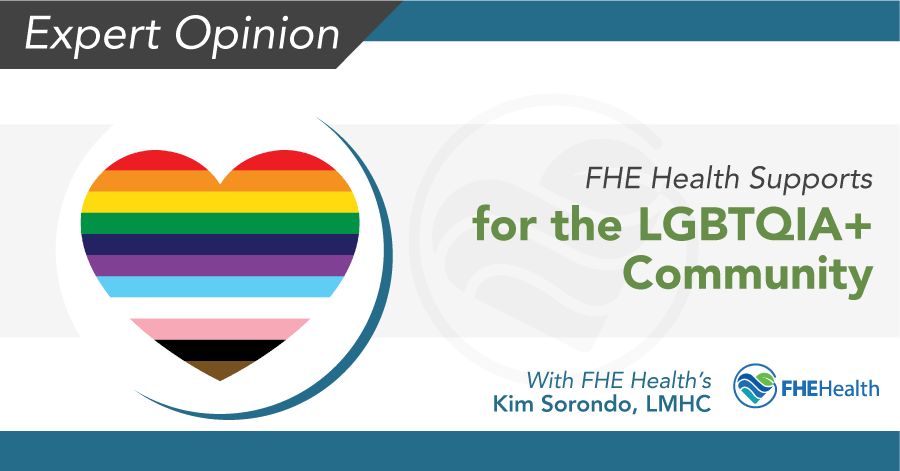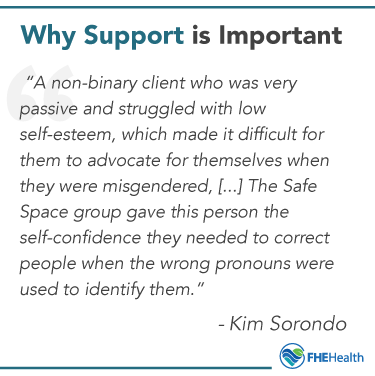
This article has been reviewed for accuracy by our peer review team which includes clinicians and medical professionals. Learn more about our peer review process.
Since we last aired this piece in June 2024, Kim Sorondo’s title has changed to Patient and Family Support Clinician.
Members of the LGBTQIA+ community face unique mental health challenges related to being Lesbian, Gay, Bisexual, Transgender, Queer/Questioning, Intersex, or Asexual/Ally. Discrimination and stigmatization feature prominently in the LGBTQIA+ experience, and LGBTQIA+ members are at higher risk of substance abuse, self-harm, suicide, and potential ostracization by friends and/or family. In June 2023, for the first time in its four-decade history, the Human Rights Campaign declared a national state of emergency for members of the LGBTQIA+ community.
What Support FHE Health Offers the LGBTQIA+ Community
 Kim Sorondo, LMHC, is working to change that, by helping LGBTQIA+ clients feel safe and supported. Sorondo is a licensed mental health counselor in FHE’s Restore Mental Health program. Thanks to prior experience working in the LGBTQIA+ treatment setting, Sorondo has expertise in this area and has been assisting FHE Health to improve its care and support for those whose gender and/or sexual orientation fall outside of “the binary.” (The term “non-binary” is “used to describe people who understand their gender presentation in a way that goes beyond simply identifying as either a man or woman,” Sorondo explained.)
Kim Sorondo, LMHC, is working to change that, by helping LGBTQIA+ clients feel safe and supported. Sorondo is a licensed mental health counselor in FHE’s Restore Mental Health program. Thanks to prior experience working in the LGBTQIA+ treatment setting, Sorondo has expertise in this area and has been assisting FHE Health to improve its care and support for those whose gender and/or sexual orientation fall outside of “the binary.” (The term “non-binary” is “used to describe people who understand their gender presentation in a way that goes beyond simply identifying as either a man or woman,” Sorondo explained.)
In a recent interview, Sorondo talked about what FHE Health was doing to support these clients. She also described some of the commonly occurring mental health and addiction issues that she encountered within the LGBTQIA+ community.
What Is the Safe Space Support Group?
The Safe Space meeting is a peer support group for people who identify as LGBTQIA+. They meet to share their experiences, discuss topics like coming out, and find ways to encourage and empower one another in a non-judgment environment. Sorondo helped start the group in 2022, after leading a clinical training for FHE clinicians on how to be sensitive to clients with issues related to sexual orientation and gender identity.
“In 2022, I provided a presentation for the clinical staff on this population and the special challenges associated with being gender-variant,” Sorondo said.
Sorondo’s presentation generated interest in ways to support gender-variant clients, one of which was the peer support group Safe Space. Today, Sorondo helps to lead and facilitate the group.
Whatever your gender and sexual identification along the spectrum that is LGBTQIA+, the Safe Space meeting is where you can go to feel accepted, understood, and supported. The Safe Space group is also where you can go to show your solidarity with the LGBTQIA+ community, either as a member or an ally.
More FHE Health Supports for LGBTQIA+ Clients: An Update
What, if any, changes or trends had Sorondo observed in recent years?
- Notably higher admissions from the LGBTQIA+ community – The number of gender-variant people seeking treatment through Restore has “grown exponentially,” Sorondo said.
- LGBTQIA+-inclusive changes to Restore Mental Health programming – Restore Mental Health is now a self-contained program, meaning that clients can stay in the same place for the duration of their treatment, regardless of their level of care. This has made it easier for gender-variant clients to form connections and remain in a supportive environment with their peers.
- Training in inclusivity and events to show solidarity, such as celebrating Pride Month – Sorondo has continued to train staff on topics like inclusivity and to help organize events in support of the LGBTQIA+ community. Sorondo is hopeful that these events will draw more participation from staff in the coming years.
Recognizing Gender Non-Conforming and Sexual Orientation with Language and Pronouns
Another support has been the language sensitivity and pronoun accuracy that Sorondo and her colleagues are careful to practice when referring to gender. Whether it’s in a client’s chart, in a group, or in an individual therapy setting, it sends the message that “we see you, and respect your pronouns in a non-judgmental environment,” Sorondo said.
A vocabulary that describes all variations can be complicated to understand. Sorondo gave the example of an assessment with a client who identified their sexual orientation as “pan-sexual.” If you’re wondering what that means, here is how Sorondo defined the term: “People who identify as Pan-sexual fall in love with ‘hearts not just parts,’ no matter their gender identity.”
Examples of How This Support Has Helped the LGBTQIA+ Community
How has this support helped members of the LGBTQIA+ community? Sorondo shared some examples:
- “A non-binary client who was very passive and struggled with low self-esteem, which made it difficult for them to advocate for themselves when they were misgendered,” Sorondo said. “The Safe Space group gave this person the self-confidence they needed to correct people when the wrong pronouns were used to identify them.”
- “As a sounding board for its members, the Safe Space group has led to additional ways that our staff can further support the LGBTQIA+ community at FHE Health,” Sorondo said.
Some of the More Common LGBTQIA+ Mental Health Challenges
Like the general population, the LGBTQIA+ community is susceptible to a broad range of mental health challenges. There can also be a lot of variation between people on the LGBTQIA+ spectrum, “which encompasses both gender identity and sexual orientation,” and Sorondo was careful to emphasize this diversity.
At the same time, Sorondo acknowledged that this population encounters certain mental health and substance abuse challenges that tend to be prevalent in the LGBTQIA+ community, and they are at higher risk of engaging in maladaptive coping, including Chemex, alcoholism, and other illicit substances.
Self-Harm Behaviors Like Eating Disorders and Substance Abuse
People often struggle with coming out to family, friends, and coworkers, and this can trigger anxiety and depression. To deal with the rejection they experience from family and society they “may turn to maladaptive coping, including self-harm,” Sorondo said. These struggles can co-occur with alcohol and drug use.
The Importance of Personalized Care
One interview cannot possibly cover all the ground, as Sorondo is the first to admit. They may share a common acronym, but the LGBTQIA+ community represents a very broad and diverse group of people, whose mental health and addiction experiences are equally broad and diverse— one might call it “a rainbow” of difference.
At FHE Health, we understand the unique challenges that LGBTQIA+ clients face. We also make it our aim to ensure that each patient in our care feels accepted, supported, and empowered in their journey toward healing and/or recovery. For more information about support for you or a loved one, contact FHE today.






